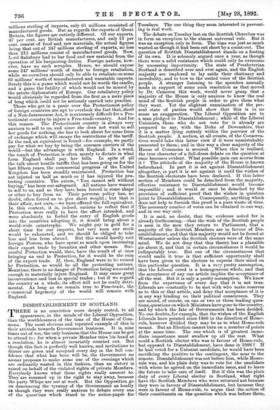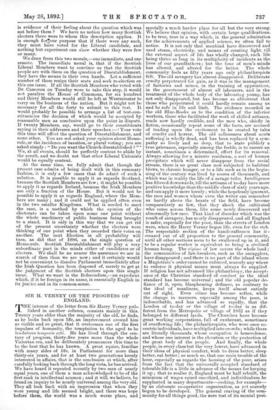DISESTABLISHMENT IN SCOTLAND.
MHERE is no conviction more deeply rooted, to all appearance, in the minds of the Liberal Opposition, than the worthlessness of the time of the House of Com- mons. The most obvious and repeated example of this is their attitude towards Government business. It is, nine times out of ten, the only business that the House can be got to attend to ; for when a private Member tries his hand at a resolution, he is almost invariably counted out. But though this fact is perfectly well known, and invitations to dinner are given and accepted every day in the full con- fidence that what has been will be, the Government no sooner proposes to make some use of the evenings which are ordinarily wasted in this fashion, than an outcry is raised on behalf of the violated rights of private Members. Everybody knows what these rights really amount to. They are summed up in the right to stay away, because the party Whips are not at work. But the Opposition go on denouncing the tyranny of the Government as loudly as though they were really anxious to debate every one of the questions which stand in the notice-paper for Tuesdays. The one thing they seem interested in prevent- ing is real work.
The debate on Tuesday last on the Scottish Churches was in form an exception to the almost universal rule. But it was an exception only in form. The time was just as much wasted as though it had been cut short by a count-out. The question of Scottish Disestablishment stands on a footing of its own. It is solemnly argued once a year, as though there were a solid resistance which could only be overcome by unceasing importunity. The state of Presbyterian Scotland is described over and over again, and. the English majority are implored to lay aside their obstinacy and incredulity, and to bow to the united voice of the Scottish people. A stranger listening to the speeches annually made in support of some such resolution as that moved by Dr. Cameron this week, would never grasp that a majority of the House is only anxious to know the real mind of the Scottish people in order to give them what they want. Yet the slightest examination of the pre- sent state of parties would show that this is in no sense an exaggeration. The Liberal Opposition are to a man pledged to Disestablishment ; while of the Liberal Unionists, those who do not vote for it already are prepared to say, with the Duke of Devonshire, that it is a matter lying entirely within the purview of the Scottish people. A section, at all events, of the Conserva- tives would take this latter view if it were unmistakably presented. to them ; and in this way a clear majority of the House of Commons is secured. When this is realised, the true character of a full-dress debate on the question at once becomes evident. What possible gain can accrue from it The attitude of the majority of the House is known beforehand. In part it is set against Disestablishment altogether, in part it is set against it until the wishes of the Scottish electorate have been declared. If this latter section of Members could be detached from the majority, effective resistance to Disestablishment would become impossible ; and it would at once be detached by the provision of sufficient proof that the wishes in question point to Disestablishment. Consequently, anything which does not help to furnish this proof is a pure waste of time. The necessary number of votes can be obtained in one way, and in one way only.
It is said, no doubt, that the evidence asked for is already forthcoming,—that the wish of the Scottish people is seen in the men they return to Parliament, that a majority of the Scottish Members are in favour of Dis- establishment, and that this majority would not be found at Westminster unless the Scottish electors were of the same mind. We do not deny that this theory has a plausible air about it, and that in certain circumstances it would be indisputably true. But one of the circumstances that would make it true is that sufficient opportunity shall have been given to the electors to express their mind on this particular question. It is a very pretty assumption, that the Liberal creed is a homogeneous whole, and that the acceptance of any one article implies the acceptance of all the rest. But it is only a pretty assumption. We know from the experience of every day that it is not true. Liberals are constantly to be met with who make reserves as to this or that article, and deny that acceptance of it is in any way binding on their political consciences. They are sound, of course, on one or two or three leading ques- tions, questions on which Ministers have gone to the country, and by which the fate of Governments has been decided.
No one doubts, for example, that the wishes of the English Liberals have pointed since 1886 in the direction of Home- rule, however divided they may be as to what Home-rule means. But an Election cannot turn on a number of points at the same time. The one which is of greatest imme- diate importance must swallow up all the rest. What could a Scottish elector who was in favour of Home-rule, but opposed to Disestablishment, have done in 1886? If he had voted for a Unionist candidate, be would have been sacrificing the positive to the contingent, the near to the remote. Disestablishment was not before him, while Home- rule was, and his plain duty was to vote for the candidate with whom he agreed on the immediate issue, and to leave the future to take care of itself. But if this was the plain duty of every Liberal elector in Scotland, what right have the Scottish Members who were returned not because they were in favour of Disestablishment, but because they were in favour of Home-rule, to argue that the action of their constituents on the question which was before them, is evidence of their feeling about the question which was not before them ? We have no notion how many Scottish electors there were to whom this description applies. It is enough folour purpose that if there were any such, they must have voted for the Liberal candidate, and nothing but experiment can show whether they were few or many.
We draw from this two morals,—one immediate, and one remote. The immediate moral is, that if the Scottish Liberal Members want to convince us that the Scottish people are with them on the question of Disestablishment, they have the means in their own hands. Let a sufficient number of them resign their seats and seek re-election on this one issue. If all the Scottish Members who voted with Dr. Cameron on Tuesday were to take this step, it would not paralyse the House of Commons, for six hundred and thirty Members would still be left at Westminster to carry on the business of the nation. But it might not be necessary for all the forty to submit to this test. It would probably be possible to arrange a list of test-con- stituencies the decision of which would be accepted by reasonable men as conclusive upon the point in dispute. If twenty Members, say, would go to their constituents saying in their addresses and their speeches :—' Your vote this time will affect the question of Disestablishment, and none other. You are not asked your opinion about Home- rule, or the incidence of taxation, or plural voting ; you are asked simply : "Do you want the Church disestablished ? " ' We, it all events, should be perfectly content to abide by the result, and we doubt not that other Liberal Unionists would be equally content. At the same time, we fully admit that though the present case admits of being dealt with in this summary fashion, it is only a few cases that do admit of such a solution. It is possible to apply it as regards Scotland, because the Scottish Members are few ; it might be possible to apply it as regards Ireland, because the Irish Members are only a fraction of the House. But it would not be possible to apply it as regards England, where the Mem- bers are many ; and it could not be applied often even in the two smaller Kingdoms. What is needed to meet the case, is a method by which the opinion of the electorate can be taken upon some one point without the whole machinery of public business being brought to a stand. It is only in this way that we can get rid of the present uncertainty whether the electors were thinking of one point when they recorded their votes on another. The next Election in all probability will turn, as did that of 1886, on the single question of Home-rule. Scottish Disestablishment will play a very subordinate part in the minds either of candidates or of electors. We shall be no nearer the assurance we are in search of then than we are now ; and it certainly would not be convenient to dissolve Parliament immediately after the Irish Question has been disposed of, merely to get at the judgment of the Scottish electors upon this single issue. What we want is the Referendum,—an expedient which, if it be foreign in its name, is essentially English in its justice and in its common-sense.







































 Previous page
Previous page